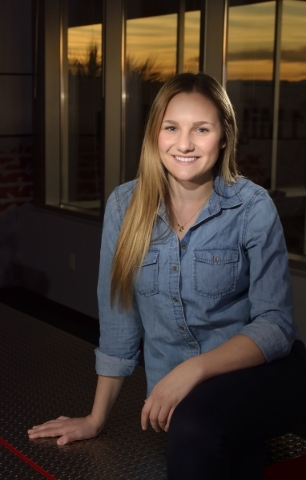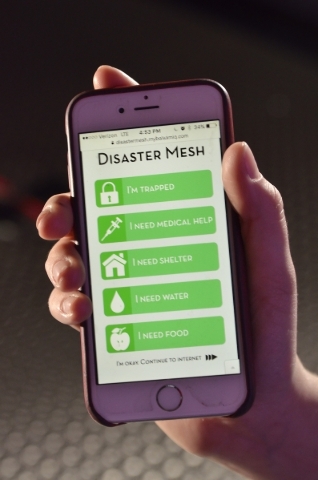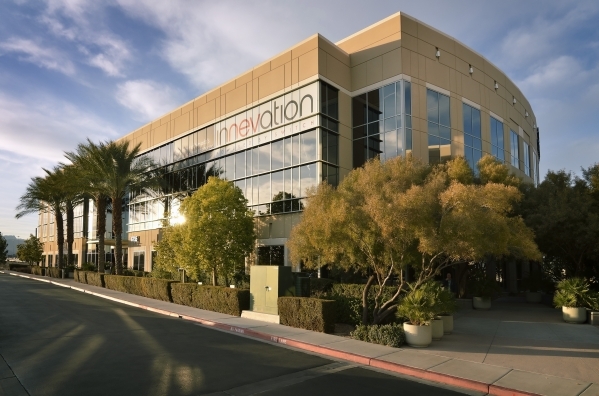Gorman student helps brainstorm wireless mesh network for disaster survivors
For Katelyn Dunn, now 17 and a senior at Bishop Gorman High School in Las Vegas, the slow days of summer in 2014 had to be reckoned with.
So she enrolled in a summer program at Singularity University, located at Moffett Federal Airfield in California.
Within five weeks, she found a world of work — helping people survive disasters.
Dunn is now chief technical officer of Disaster Mesh, a social purpose corporation with a product that earned a $250,000 award in Verizon's Powerful Answers Award challenge on Dec. 9 in San Francisco.
Dunn said she and fellow Disaster Mesh founders Margaux Giles and Karla Dana, both college students, were inspired to create their product — striking out into the male-dominated world of technology — after hearing from disaster survivors. None of the three had any formal background in engineering, Dana said.
The Singularity program required the future co-founders to pick a cause for which they would use "exponential technologies to solve the world's problems," Dunn said.
Finding the cause wasn't hard.
"We had personal testimony from a girl who'd been a few miles outside of the impact zone of the Chile earthquake," Dunn RECALLED.
With cell towers overloaded, texting and calling couldn't resolve the mystery of whether the girl's family members were still alive.
"That tugged on our heart strings," Dunn said. "All they really want is to connect with each other, and to say, 'Yes, I'm OK.'"
The three-woman team came up with Disaster Mesh, a mesh network that re-establishes wireless connectivity in disaster areas. The network uses small devices, or "seeds," modeled after the maple seed.
The devices "float down softly," according to the company website. Planes, helicopters and drones can drop them. Once connected, survivors communicate their needs and whether they're OK. The network also can collect information, GPS coordinates and names of survivors for relief organizations.
'They're an inspiration'
Jerry Rizzo, a Verizon spokesman, said Dunn and the team are the youngest winners chosen to receive funding in the Powerful Answers competition, which completed its third year. The competition attracted more than 1,400 entries, from more than 78 countries, Rizzo said. Only a quarter were female-founded companies.
"They're an inspiration, not only for all tech entrepreneurs, but for anyone who wants to pursue putting your ideas into reality to make the world a better place," Rizzo said.
Lucrezia Bisignani, actress, entrepreneur, and founder of Kukua, an edtech startup focused on solving illiteracy in Africa, remembered the day Dunn and team invited her to hear their pitch, the day before final demo day at Singularity.
"Their pitch was flawless," she wrote recently by email. "I remember thinking, 'Wow — these three girls really have guts!'"
She invited them to pitch at the European Maker Faire 20 Under 20 Conference.
Whether pit stopping in Rome, making contacts at UNICEF or traveling from different corners of the United States to the Bay Area to pitch and discuss — or refining their latest prototype — the team is still on the go. Dunn said she typically puts in one to two hours every afternoon.
Her friends understand that "sometimes, I can't always go to lunch after school because I'm going out of town," she said.
Still, being young and entrepreneurial has its setbacks.
Dunn couldn't present at the Verizon event in December because she wasn't 18. So, she offered support while Giles and Dana did the honors. And, last year's challenge pitted the trip to Italy against the reality that Dunn would have to miss two full weeks of school in the midst of a critical school year.
"Junior year, these are the grades to go to college," she said. "There's a lot of pressure to do well academically."
Dana, chief operating officer of Disaster Mesh, remembers the day she met Dunn at Singularity.
"I remember thinking that Katelyn was very young," she said. "I was very impressed because I was 19. I think she was 15 or 16 at the time."
"We call her the chief technology officer and the head of sassy comments," she joked.
'Think a little bit bigger'
Dunn said she's making the most of her youth.
"All of us are so lucky that we're not doing the grown-up thing, having a job," she added. "Having to quit our jobs. Having to drop out of school to make this happen. We don't have anything to lose. We're showing that to other teens who are looking to create impact."
She plans on majoring in computer science and is considering the possibility of a career involving cybersecurity. For her generation, she said, computers may have made the world more "accessible."
"I think it's become more of a trend to think a little bit bigger," she added, reflecting on her peers.
As for those big-world dreams, they include covering any disaster in the world with Internet, Dana said, "so when survivors see our seeds coming down, that's a sign of life for them."
Dunn's advice to other young entrepreneurs: "As a businesswoman, I would say, if you take yourself seriously, other people will take you seriously."




















